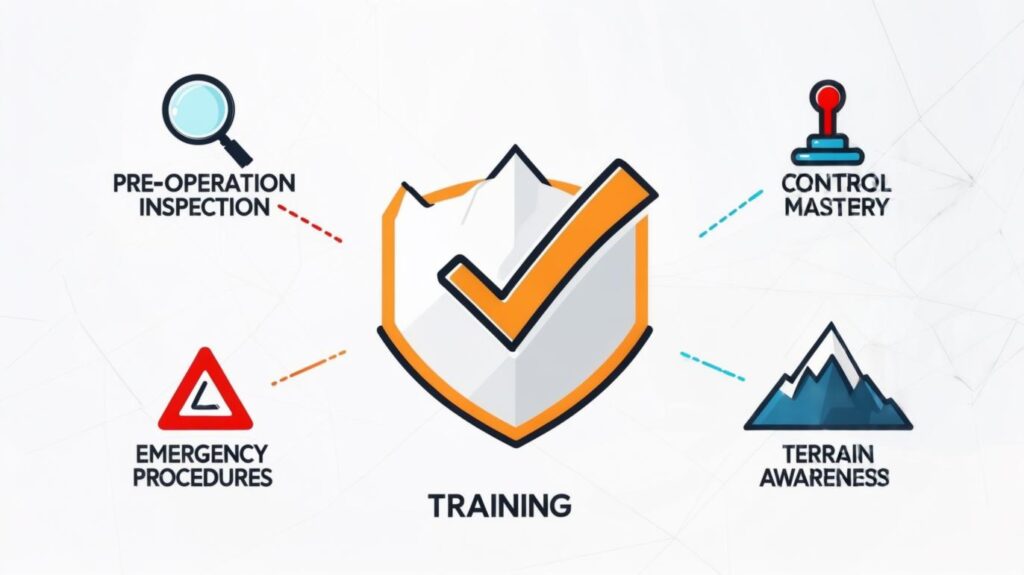How to Train Your Excavator Operators for Maximum Safety and Efficiency

In the fast-paced world of construction, efficiency and safety aren’t just goals—they’re non-negotiable. At the center of this balance stands one of the most powerful tools on-site: the excavator. But even the most advanced machine can become a liability in the hands of an undertrained operator. That’s where proper excavator training comes into play.
Whether you manage a fleet of machines or are just starting a small excavation business, investing in structured, ongoing training can transform your team from machine users into machine masters. This article breaks down how to train excavator operators not just to operate the machine, but to excel in safety, productivity, and confidence.
Why Excavator Training is More Important Than Ever

Modern job sites are evolving, and so are the machines. Excavators today come equipped with GPS, advanced hydraulics, and telematics systems. With these upgrades, the risk of operator error rises if training doesn’t keep pace.
According to OSHA, inadequate training is one of the leading causes of machinery-related accidents on construction sites. Poor training not only endangers workers but can also result in costly delays, equipment damage, and reputational loss.
The Benefits of Effective Excavator Training
- Increased Job Site Safety: Trained operators can anticipate risks and follow safety protocols instinctively.
- Lower Equipment Downtime: Proper usage reduces wear and tear and minimizes breakdowns.
- Boosted Productivity: Operators know how to use advanced features to work faster and more accurately.
- Compliance Assurance: Meets local, national, and even global standards, avoiding fines or legal trouble.
In-House vs. Third-Party Training: Which is Right for You?

When it comes to excavator training, choosing the right method is crucial. Here’s a quick comparison to help decide:
| Factor | In-House Training | Third-Party Training |
|---|---|---|
| Cost | Lower (initially) | Higher (but more comprehensive) |
| Customization | Tailored to specific job site needs | Follows a standard curriculum |
| Instructor Expertise | May vary by site | Certified, industry-recognized experts |
| Certification | Depends on trainer | Recognized credentials issued |
| Scalability | Ideal for small teams | Better for growing companies |
Pro Tip: Many companies adopt a hybrid model—using third-party programs for certification and in-house follow-ups for practical job-site application.
Core Elements of a Successful Excavator Training Program
Training should be more than a one-day seminar. A robust program combines classroom instruction, hands-on practice, ongoing assessment, and mentoring. Below are the key components:
1. Classroom Instruction
This foundational phase covers:
- Machine anatomy and controls
- Understanding load capacities
- Safety regulations and emergency procedures
- Daily inspection protocols
Include multimedia content like videos and diagrams to increase engagement.
2. Hands-On Training
Nothing replaces seat time. Practical sessions should involve:
- Basic digging and trenching exercises
- Material loading/unloading
- Operating on various terrains
- Emergency stop and recovery procedures
Use real-world job site simulations to mirror potential challenges.
3. Soft Skills and Communication
Excavator operators don’t work in a vacuum. Emphasize:
- Communication with spotters
- Reading site plans
- Conflict resolution on busy job sites
4. Assessment and Certification
Use written tests and practical evaluations to ensure retention. Partner with organizations like NCCER or CPCS for standardized certification.
5. Ongoing Learning and Refreshers
Construction technology evolves fast. Monthly or quarterly refresher sessions help keep skills sharp. Some companies use VR simulators to mimic complex or risky scenarios in a controlled environment.
Common Training Mistakes to Avoid
Even well-intentioned training can go wrong. Here are common pitfalls:
- Skipping foundational training because the operator “has experience”
- One-size-fits-all programs that ignore site-specific challenges
- Overloading new hires without allowing for learning curves
- Neglecting retraining even after incidents or machinery upgrades
Addressing these proactively can mean the difference between safe operations and dangerous oversights.
Integrating Excavator Training Into Your Company Culture
Training should be seen not as a cost, but as an investment. Create a culture that values learning and professional development:
- Reward certifications with pay incentives or promotions
- Assign mentors for new operators
- Celebrate safety milestones publicly
- Use digital tracking tools to monitor training completion and performance
Platforms like Procore and HeavyJob offer integrated tools to manage training records and operator performance metrics.
Conclusion: Safety Today, Success Tomorrow

Well-trained excavator operators are not just machine handlers—they are safety champions, productivity boosters, and essential team players. With structured excavator training, you not only safeguard your workforce but also elevate the entire operation’s efficiency.
If you’re serious about minimizing downtime, boosting ROI, and building a safety-first culture, start by investing in your operators today.
Ready to Elevate Your Training Program?
Start by evaluating your current approach. Need help? Explore our related guides or reach out for a custom training strategy. Share your thoughts below or connect with our team to schedule an on-site consultation.
Let’s move dirt—safely and smartly.
